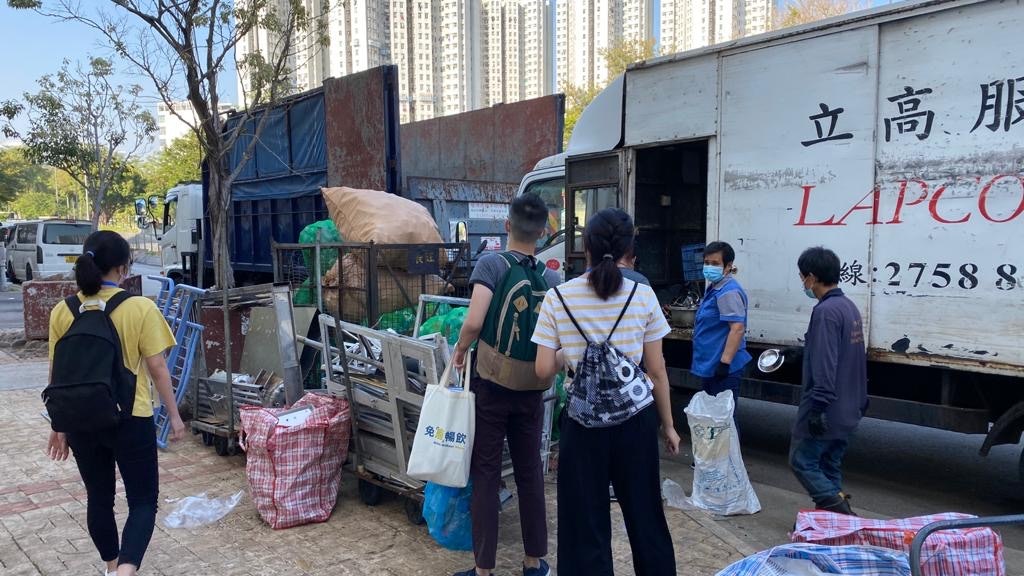Social News
Written by: Ma Weijie
2021-03-30 17:16
The last update date: 2021-03-30 17:17
[Plastic Bottle Recycling] The Environmental Protection Department today (22nd) launched a public consultation on the "Plastic Beverage Container Producer Responsibility Program". It is recommended that the public recycle a plastic bottle and receive a 1 cent rebate, and a recycling fee will be levied on beverage suppliers.
The Working Group of Concern Groups to Avoid "Waste" Drinks in November 2020 implemented the "5 Cents Rebate Pilot Scheme" in the community. It has been implemented for 5 months and has subsidized the recycling of approximately 281 tons of plastic bottles (approximately 11 million).
The group pointed out that among the various recycling methods, mobile recycling flash stations in the form of recycling vehicles patrolling in various districts are the most successful. Each recycling point can recycle approximately 11.32 tons of plastic bottles per month.
The "Waste" Drinking Free Working Group has implemented the "5 Cents Rebate Pilot Program" in the community since November last year. As of March this year, it has subsidized the recycling of a total of 281 tons of plastic bottles (approximately 11 million), including recycling flash stations, Recycling corner shops and special recycling areas for processing and recycling.
"Free-flow" Drinking Free has conducted research on the amount of recycled plastic bottles in the past, and found that as long as a reward of 5 cents is provided, more than 70% of consumers can be encouraged to recycle plastic bottles after drinking.
In this pilot project, the public will take plastic bottles to the collection point for recycling. Except for each bottle that will receive 5 cents, more than 20 plastic bottles will be calculated by weight, and the recycling price will be 2 yuan per kilogram.
In the pilot project, someone tried to bring 8 large bags of plastic bottles to the scene for recycling. Based on an 8 kg bag, you could get about 128 yuan.
Covering about 25 housing estates or housing estates in Tin Shui Wai, the most enthusiastic response
The project is mainly operated in three ways: recycling pop-up stations, recycling corner shops and recycling areas. Among them, the recycling pop-up stations use mobile recycling vehicles to collect plastic bottles from nearby residents in the housing estate or at the garbage station in the parking lot.
Earlier, recycling trucks visited about 25 housing estates or housing estates. Each recycling point can recycle about 11.32 tons of plastic bottles per month; the recycling corner shops and the recycling dedicated areas can recycle approximately 0.94 tons and 0.27 tons per month, respectively.
Mok Wing-shen, director of the "Waste Free Drink" project, pointed out that among the three models, the flash recycling station is the most successful, and among the three models, the collection point is the garbage station or the roadside of the housing estate with the highest collection volume, especially the Tin Shui Wai housing estate The most effective.
It is impossible to estimate that because the community discards a large number of beverage plastic bottles at the source, the project is led by the community, and the recycling points are relatively large and concentrated.
In addition, the flash recycling method is also given more flexibility and sufficient operating space to handle a large number of plastic bottles.
Lack of space is the biggest obstacle. Advocate the government to allow space to be recycled within a limited time
The biggest obstacle to the recycling program is lack of space. The group pointed out that many places, such as parking lots, are not allowed to do recycling work due to restrictions on land use.
The "Waste" Drinking Free Working Group suggested that the Hong Kong Government should allow every community to make room for disposal of recyclables within a limited time. It also appealed to private housing estates, shopping malls and other property owners to allow beverage packaging to be sorted and provide space for recycling, just like waste. Same as paper, metal, etc.
Members of the Legislative Council blasted the plastic bottle with a 1 cent rebate as a reward for Tai Ershi Huang Jinxing: only the starting point emphasizes that there will be no subsidy
"Bottle Machine" rebates 1 cent for each recycled plastic bottle. Citizens: less attractive but better than disposal
The plastic bottle producer responsibility system is "administrative convenience". It is more efficient to provide rebates according to the bottle authorities' claims
The University of Hong Kong and the Central Group suggest that plastic bottles are charged at 1 yuan per bottle and 5 cents for recycling. Groups: more aggressive but feasible
According to a study conducted by the University of Hong Kong and the Environmental Group, 60% of the citizens who hold plastic bottles are recommended to charge a deposit of 1 yuan and a tax of 5 cents per bottle
The government intends to "recycle" plastic bottles with one cent for each rebate, and encourages the incentive to increase to five cents.
Consultation on the Responsibility System of Plastic Bottle Producers, Public Collection of Recycling Fees, Citizens Collect 1 Rebate 1 Cent
01News
Recycling and environmental protection

